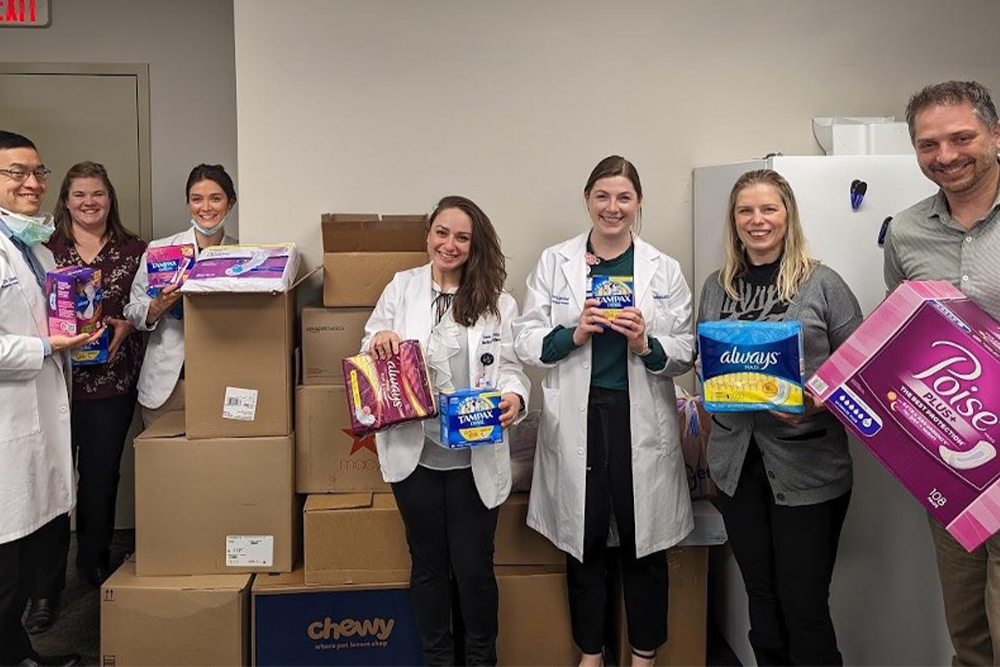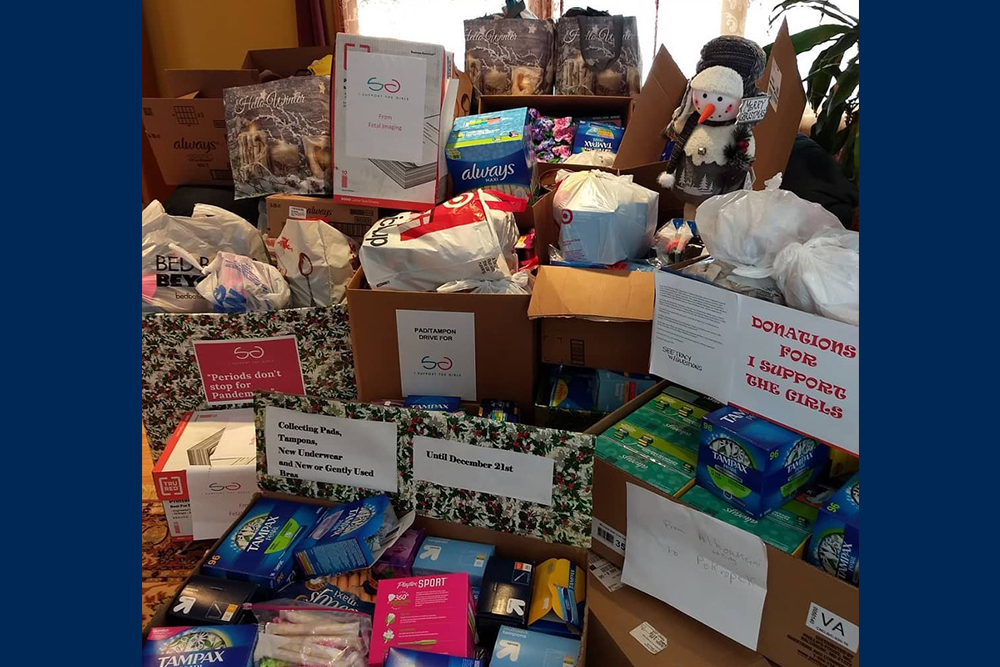
Part of OUWB’s mission is to help communities and collaborate — and proof positive can be found in a recent drive that included medical students, alumni, local physicians, and community members.
The Student Run Free Clinic (SRFC) at Gary Burnstein Community Center in Pontiac, physicians at Corewell Health, and the Detroit chapter of nonprofit I Support the Girls (ISG) collaborated to hold a feminine hygiene product drive during November and December.
More than 4,700 tampons, 8,200 pads, and 350 bladder support pads were collected. The items were split, with half given to the SRFC to provide patients at no cost, and half going to I Support the Girls to be distributed to locations that need them.
M2s Paoula Choobchian and Sarah George, co-directors, SRFC, hosted the drive because they saw how frequently the patients at their clinic took the feminine hygiene products from previous drives and wanted to continue offering them.
“The need for these types of products is really, really big… they can be really expensive,” said Choobchian.
“It's harder for (some SRFC patients) to purchase these products (and) they're really essential to use on a regular basis. By doing these types of drives, our team is able to at least make a patient's life a little easier.”
Alongside allowing the clinic to provide for patients, George said the massive turnout will allow the future directors of the clinic to address other patient needs when they’re appointed later this year.
“Although we’ll probably be set with (these) products for a while, we’ve opened up space for the new leadership to come in and find other needs that they can focus on,” she said.
This way of providing for patients, said George, is crucial to the foundation of patient-physician relationships.
“When we’re looking at what patient care means and what it means to provide holistic care, it doesn’t always need to be a huge, complicated process,” said George. “Connecting with people and recognizing what needs they have…that extends to all levels of patient care.”
“Just because you can’t do everything doesn’t mean you shouldn’t take those simple steps to make a difference,” she added.
A community effort
George and Choobchian found the opportunity to replenish their stock of products through Catherine Pokropek, M.D., an OB/GYN at Corewell Health William Beaumont University Hospital.
Pokropek began hosting product drives within her own community to support ISG in 2018 after learning about the need in southeastern Michigan for these products.
Like George, Pokropek said she finds community engagement to be an important aspect of medicine.
 |
| Just some of the items collected through the drive. |
“It develops that humanity that we need (for) our patients,” she said. “That’s something that all of us that go into medicine have ingrained in us — we want to help, not just put the Band-Aid on, put the suture in, give the shot, give the medicine…we all went into this because we want to help.”
Since 2019, the annual drive has continued to grow in size, and she has become an active participant at ISG’s Detroit branch, which supports Wayne, Oakland, Washtenaw, Macomb, and Monroe counties.
It was Pokropek who brought the nonprofit and SRFC together for the product drive.
“I learned that many of (my co-workers) are volunteering as physicians at the clinic and I learned about the mission of Gary Burnstein, really serving the immediate need in our community for the uninsured population, especially this year with inflation,” said Pokropek.
“Gary Burnstein put out that call for help, and many nonprofits are really suffering with donation, so it was just the perfect combination to involve OUWB, Corewell Labor & Delivery, and private practice doctors,” she added. “(It was) a tremendous response this year.”
Bekah Page-Gourley, affiliate director, ISG Detroit said that from her experience at the organization and working with medical professionals over the past few years, medical professionals engaging with their patients in this way can be important for their dignity and health.
“Practicing medicine is different from one area to another, so I think (by) taking it upon yourself as a medical professional to know what programs and services are available to people who have those needs in their communities and being able to point them to places that can help them, you can be a source of information for them to get the help they need to take care of their health.”
Pokropek reached out to people within her circle who then reached out to other people in their circles. This outreach led to products being gathered at OUWB, Corewell locations, and private practice doctors. Even patients donated products, she said.
“It was incredible, the generosity from everyone…I am so humbled every year.”
Beyond medical education
Emma Randall, M.D., resident physician, Corewell Health, graduated from OUWB in 2022, but said that didn’t mean leaving behind her community.
She had been assisting Pokropek with the annual product drive since her second year of medical school, and when she was contacted about assisting again, she knew she wanted to be a part.
“The drive is special to me….it was fun to be involved as a medical student, and now as an OB/GYN resident, I’m actually seeing patients out in the community and it’s really nice to be able to do something for the patients that we see,” she said.
“Sometimes we get wrapped up in the business of medicine, so the drive gives us an opportunity to pause and do something good for the community.”
OUWB, Randall said, sets the foundation for future physicians to be involved with the communities they will serve.
“OUWB does a great job of focusing and giving us opportunities as students to get involved in the community,” Randall added. “I volunteered at the Student Run Free Clinic…it gave me the opportunity to establish a connection with the community while I was a medical student. It made me want to continue that as a resident here.”
Several of the drive’s organizers said they found the collaborative nature of the drive to be crucial to its success.
“It’s a really satisfying grassroots effect that these efforts can have,” said Page-Gourley. “As long as you keep your perspective and try to keep things local, remember that you can really make a difference in small things right where you are.”
“(We’ve) been able to work with so many different people in the medical system: levels of physicians, medical students at all different places, patients,” said George.
“Recognizing that collaboration is not just within our medical school — it extends beyond, especially with our patients and understanding what they actually need — is something that is very aligned with what we’re taught at OUWB.”
To request an interview, visit the OUWB Communications & Marketing webpage.
This work is licensed under a Creative Commons Attribution-NonCommercial 4.0 International License.

